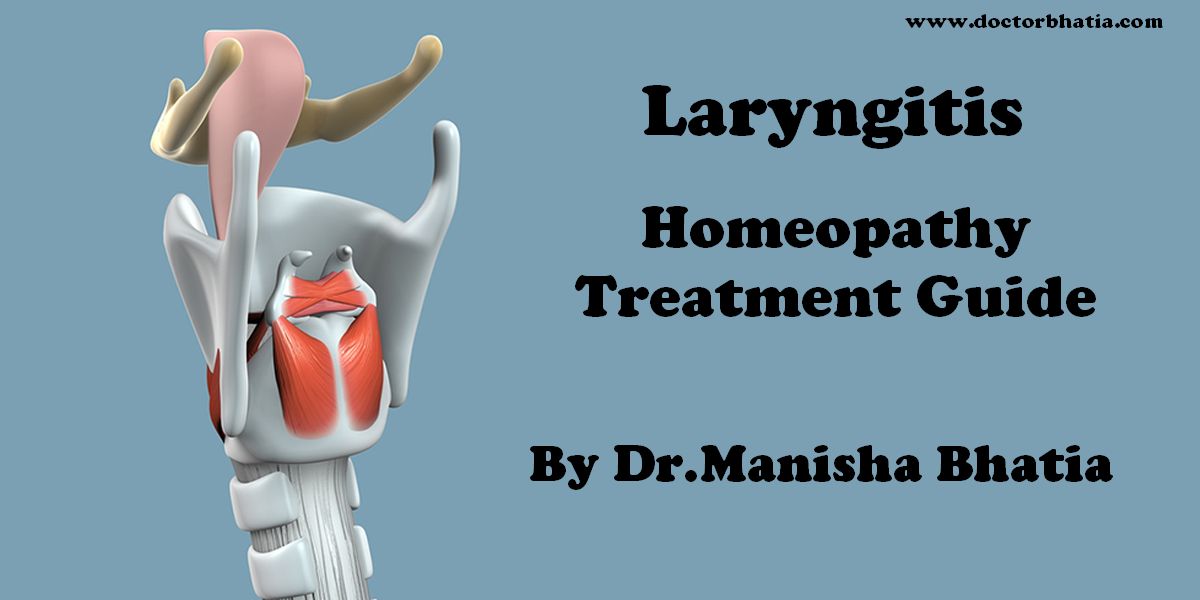Laryngitis is an inflammation of the larynx. It causes hoarse voice or the complete loss of the voice because of irritation to the vocal folds (vocal cords).
Laryngitis is categorized as acute if it lasts less than a few days.[1] Otherwise it is categorized as chronic, and may last over 3 weeks.
Causes of Laryngitis
- viral infection
- bacterial or fungal infection
- inflammation due to overuse of the vocal cords[2][3][4][5][6]
- excessive coughing
- excessive alcohol consumption
- excessive smoking
Symptoms of Laryngitis
Symptoms of laryngitis vary, depending on the severity and also the cause. The most common, and obvious, symptom is impaired speech, ranging from a raspy hoarseness to the total loss of ability to speak, except at a whisper. Other symptoms can include:
- Dry, sore throat
- Coughing, which can be a symptom of, or a factor in causing laryngitis;
- Difficulty swallowing;
- Sensation of swelling in the area of the larynx;
- Cold or flu-like symptoms (which, like a cough, may also be the causing factor for laryngitis;)
- Swollen lymph glands in the throat, chest, or face;
- Fever
Treatment of Laryngitis
In most instances, the symptoms accompanying laryngitis are more directly linked to the causative factor, such as infection. In cases caused by overuse of the voice, symptoms other than vocal impairment may be absent. Laryngitis, hoarseness or breathiness that lasts for more than two weeks may signal a voice disorder and should be followed up with a voice pathologist. This is typically a vocology certified SLP (speech language pathologist) or a laryngologist (voice specialized ENT).
If laryngitis is due to gastroesophageal reflux:
- The patient may be instructed to take a medication such as Zantac or Prilosec for a period of 4-6 weeks.
If laryngitis is due to a bacterial or fungal infection:
- The patient may be prescribed a course of antibiotics or anti-fungal medication.
If persistent hoarseness or loss of voice (sometimes called “laryngitis”) is a result of vocal cord nodules:
- Physicians may recommend a course of treatment that may include a surgical procedure and/or speech therapy.
- Reduction of high-impact stress to the vocal cords caused by loud, frequent, and high pitched voicing is recommended.
Homeopathy Treatment for Laryngitis
Keywords: homeopathy, homeopathic, treatment, cure, remedy, remedies, medicine
Homeopathy treats the person as a whole. It means that homeopathic treatment focuses on the patient as a person, as well as his pathological condition. The homeopathic medicines are selected after a full individualizing examination and case-analysis, which includes the medical history of the patient, physical and mental constitution, family history, presenting symptoms, underlying pathology, possible causative factors etc. A miasmatic tendency (predisposition/susceptibility) is also often taken into account for the treatment of chronic conditions. A homeopathy doctor tries to treat more than just the presenting symptoms. The focus is usually on what caused the disease condition? Why ‘this patient’ is sick ‘this way’. The disease diagnosis is important but in homeopathy, the cause of disease is not just probed to the level of bacteria and viruses. Other factors like mental, emotional and physical stress that could predispose a person to illness are also looked for. No a days, even modern medicine also considers a large number of diseases as psychosomatic. The correct homeopathy remedy tries to correct this disease predisposition. The focus is not on curing the disease but to cure the person who is sick, to restore the health. If a disease pathology is not very advanced, homeopathy remedies do give a hope for cure but even in incurable cases, the quality of life can be greatly improved with homeopathic medicines.
The homeopathic remedies (medicines) given below indicate the therapeutic affinity but this is not a complete and definite guide to the homeopathy treatment of this condition. The symptoms listed against each homeopathic remedy may not be directly related to this disease because in homeopathy general symptoms and constitutional indications are also taken into account for selecting a remedy. To study any of the following remedies in more detail, please visit the Materia Medica section at Hpathy.
None of these medicines should be taken without professional advice and guidance.
Homeopathy Remedies for Laryngitis :
Acon., aesc., all-c., ant-c., ant-t., apis., arg-m., arg-n., ars., ars-i., aur-m., bell., brom., bry., bufo., calad., calc., calc-s., carb-ac., carb-an., carb-s., carb-v., caust., cham., chel., chlor., crot-c., crot-h., dros., dulc., ferr-p., gels., guai., hep., hydr-ac., iod., ip., kali-bi., kali-i., lach., mang., merc., merc-i-r., naja., nat-m., nit-ac., nux-v., ph-ac., phos., puls., rhus-t., rumx., sang., sel., seneg., spong., still., sulph., tab.
References
- ^ University of Michigan Health System. 2005. Laryngitis. McKesson Provider Technologies. Retrieved on May 16, 2007.
- ^ Titze IR, Lemke J, Montequin D (1997). “Populations in the U.S. workforce who rely on voice as a primary tool of trade: a preliminary report“. J Voice 11 (3): 254–9. PMID 9297668.
- ^ Popolo PS, Svec JG, Titze IR (2005). “Adaptation of a Pocket PC for use as a wearable voice dosimeter”. J. Speech Lang. Hear. Res. 48 (4): 780–91. doi:. PMID 16378473.
- ^ Titze IR, Hunter EJ, Svec JG (2007). “Voicing and silence periods in daily and weekly vocalizations of teachers“. J. Acoust. Soc. Am. 121 (1): 469–78. PMID 17297801.
- ^ Nix J, Svec JG, Laukkanen AM, Titze IR (2007). “Protocol challenges for on-the-job voice dosimetry of teachers in the United States and Finland”. J Voice 21 (4): 385–96. doi:. PMID 16678386.
- ^ Carroll T, Nix J, Hunter E, Emerich K, Titze I, Abaza M (2006). “Objective measurement of vocal fatigue in classical singers: a vocal dosimetry pilot study”. Otolaryngol Head Neck Surg 135 (4): 595–602. doi:. PMID 17011424.


